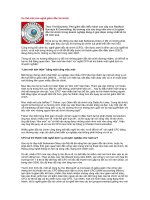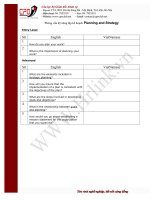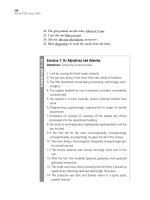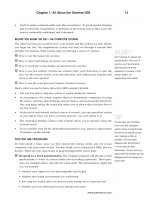Tài liệu Adjectives, the adjective phrase and adverbs doc
Bạn đang xem bản rút gọn của tài liệu. Xem và tải ngay bản đầy đủ của tài liệu tại đây (847.47 KB, 59 trang )
www.themegallery.com
LOGO
Adjectives, the
adjective phrase and
adverbs
Presented by “
HORIZON
” group
Group members
Nguyen Huyen Linh
Tran Thi Thuy Trinh
Nguyen Thi Thu Trang
Tran Bao Ngoc
www.themegallery.com
LOGO
The first presenter
www.themegallery.
com
CONTENT
D
D
B
B
C
C
A
A
Adjectives
Adjective phrase& adjectival
complementation
Adverbs
Comparison of adjectives and adverbs
content
www.themegallery.
com
Adjectives
1. Definition and classification of adjectives
2. Functions of adjectives
www.themegallery.
com
1a. Definition of adjective:
Adjective is a word which modifies a noun or pronoun
(called the adjective’s subject) by describing, identifying
or quantifying words.
Every adjective answers one of 3 questions:
www.themegallery.
com
adjective
Which one is it?
What kind is it?
How many are there?
Three
Three
questions
questions
www.themegallery.
com
1. Which one is it? (Describing)
Eg: The students who have not prepared for English class sit out an hour in the
cafeteria
Which students? Not good students but lazy slackers
2. What kind is it? (Identifying)
Eg: I like green tea
What kind of tea do you like?
3. How many are there?
Eg: There are 48 students in our class.
How many students are there in your class?
www.themegallery.
com
1b.Classification of adjectives
Their structure
2 kinds:
. Adjectives that are the roots
Eg: good, fat, little, young, hot…
.Adjectives formed by some suffixes:
Eg: Adj =N+ “ ous”: humor - humorous
“ful” : beauty - beautiful
www.themegallery.
com
V+ “ive” : act - active
“able”: read - readable
.Notes: “-ing”: property of something (Eg: This book is so interesting)
“-ed”: someone’s feeling or opinion (Eg: I found it interested
when going out with him)
www.themegallery.
com
Limiting adjectives
Quantity: many, some, any, (a) few, (a) little…
Possessive: my, your, their, his, her, its…
Indicative: that, this, those…
Order: 1st, 2nd… 20th…
“Article: a, an, the is considering as an adjective”
www.themegallery.
com
Limiting
adjectives
B
B
E
E
C
C
D
D
A
A
Quantity
Possessive
Indicative
Article Order
www.themegallery.com
LOGO
)
www.themegallery.
com
Attributive and predicative
Adj are attributive when they premodify nouns: appear between
the determiner and the head of noun phrase
Eg: the lovely cat
Predicative adj can be
+subject complement:
My hat is beautiful
+object complement:
He made her mother unhappy
www.themegallery.
com
They can be complement to a subject which is a finite clause or
a non –finite clause
Whether he will learn is true
Playing tennis isn’t easy
adj can be object complement to clause:
I consider what he said untrue
or Playing so hard
www.themegallery.
com
The adj functioning as object complement often
expresses the result of the process denoted by the
verb
He pulled the window open (as a result, the window was
then open)
www.themegallery.
com
Exercise: Modify for noun, verb, object, and subject
1.He is a nice man
2.Do you see the small green boat, which has such an old shape
3.She wore her shirt short
4.The weather becomes cold
5.Her hair was dyed blonde
6.We should keep our room clean and tidy
www.themegallery.
com
Verb less adjective clause
An adj (alone or as head of an adj phrase) can function as a verb
less clause, the clause is mobile, though it usually precedes or
follows the subject of the super ordinate clause;
Eg: (By then) happy, she opened the gift
She, (by then) happy, opened the gift
She opened the gift, by then happy
www.themegallery.
com
The implied subject is usually the subject of sentence. Thus, while we
have
Eg: The man restrained the woman, who was aggressive
We do not have as its equivalent
*the man restrained the woman, aggressive
www.themegallery.
com
However, if the clause contains additional clause
constituents, its implied subject can be other than the
subject of the sentence:
Eg: She glanced with disgust at the cat, quiet (now) in her
daughter’s lap
www.themegallery.
com
An adverb may sometimes replace, with little difference in
meaning, an adj functioning as a verb less clause:
Eg: Happy, she opened the gift
Happily, she opened the gift
www.themegallery.
com
(When the implied subject is the whole clause, a corresponding
adverb can replace the adj with little or difference in meaning, as with
strangely for strange:
Strangely, it was she wanted to live far from home
The adj, unlike the adverb, allows a that- or how-clause to follow:
+that……
www.themegallery.
com
Exclamatory adjectives sentence
An adj as head of an adj phrase or its sole realization can
be an exclamation:
How beautiful girl!
How a nice day!
What a lovely cat!
What a pity!
How wonderful
www.themegallery.
com
Postpositive
Adj can sometimes be postpositive, they can sometimes
follows the item they modify .A postposed adj (together
with many complementation it may have) can usually be
regarded relative clause
www.themegallery.
com
Indefinite pronouns ending in-body, -one, -thing- where
can be modified only postpositively:
Eg: I want to do something better (ie which is better’)
www.themegallery.
com
Postposition is obligatory for a few adj, which have a
different sense when they occur attributively or
predicatively. The most common are probably elect and
proper as in: “the Pesident elect the city London proper”









